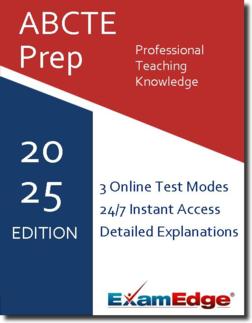ABCTE Professional Teaching Knowledge ( Professional Teaching Knowledge) Practice Tests & Test Prep by Exam Edge - FAQ
Based on 29 Reviews
- Real Exam Simulation: Timed questions and matching content build comfort for your ABCTE Professional Teaching Knowledge test day.
- Instant, 24/7 Access: Web-based ABCTE Professional Teaching Knowledge practice exams with no software needed.
- Clear Explanations: Step-by-step answers and explanations for your ABCTE exam to strengthen understanding.
- Boosted Confidence: Reduces anxiety and improves test-taking skills to ace your ABCTE Professional Teaching Knowledge (PTK).

Why should I use Exam Edge to prepare for the ABCTE Professional Teaching Knowledge Exam?
FAQ's for Exam Edge ABCTE Professional Teaching Knowledge practice tests
- Comprehensive content: Exam Edge's ABCTE Professional Teaching Knowledge practice tests are created specifically to prepare you for the real exam. All our ABCTE Professional Teaching Knowledge practice test questions parallel the topics covered on the real test. The topics themselves are covered in the same proportions as the real test too, based on outlines provided by the American Board for Certification of Teacher Excellence in their ABCTE Professional Teaching Knowledge test guidelines.
- Realistic practice: Our ABCTE Professional Teaching Knowledge practice exams are designed to help familiarize you with the real test. With the same time limits as the real exam, Our ABCTE practice tests enable you to practice your pacing and time management ahead of test day.
- Detailed explanations: As you complete your practice tests, we show you which questions you answered correctly and which ones you answered incorrectly, in addition to providing you with detailed step-by-step explanations for every single ABCTE Professional Teaching Knowledge practice exam question.
- Performance insights: After you complete a practice test, we provide you with your raw score (how many you answered correctly) and our estimate of the ABCTE Professional Teaching Knowledge score you would have received if you had taken the real test.
- Ease of access: Because all Our ABCTE practice tests are web-based, there is no software to install. You can take ABCTE Professional Teaching Knowledge practice exams on any device with access to the internet, at any time.
- Flexible use: If you must pause while taking one of Our ABCTE practice exam, you can continue right where you left off. When you continue the test, you will start exactly where you were, and with the same amount of time you had remaining.
- Thousands of unique questions: We offer 20 different online practice exams with 2,020 unique questions to help you prepare for your ABCTE Professional Teaching Knowledge !
- Low cost: The cost of ordering 5 practice tests is less than the cost of taking the real ABCTE Professional Teaching Knowledge test. In other words, it would be less expensive to order 5 practice tests than to retake the real ABCTE Professional Teaching Knowledge exam!
- Our trusted reputation: As a fully accredited member of the Better Business Bureau, we uphold the highest level of business standards. You can rest assured that we maintain all of the BBB Standards for Trust.
- Additional support: If you need additional help, we offer specialized tutoring. Our tutors are trained to help prepare you for success on the ABCTE Professional Teaching Knowledge exam.
What score do I need to pass the ABCTE Professional Teaching Knowledge Exam?
To pass the ABCTE Professional Teaching Knowledge test you need a score of 257.
The range of possible scores is 0 to 500.
How do I know the practice tests are reflective of the actual ABCTE Professional Teaching Knowledge ?
At Exam Edge, we are proud to invest time and effort to make sure that Our ABCTE practice tests are as realistic as possible. Our practice tests help you prepare by replicating key qualities of the real test, including:
- The topics covered
- The level of difficulty
- The maximum time-limit
- The look and feel of navigating the exam
Do you offer practice tests for other American Board for Certification of Teacher Excellence subjects?
Yes! We offer practice tests for 12 different exam subjects, and there are 180 unique exams utilizing 21070 practice exam questions. Every subject has a free sample practice test you can try too!
ABCTE Biology (BIO)
Practice Tests
ABCTE Chemistry (CHEM)
Practice Tests
ABCTE Elementary Education (ELEMED)
Practice Tests
ABCTE English Language Arts (ELA)
Practice Tests
ABCTE General Science (GENSCI)
Practice Tests
ABCTE Mathematics (High School Math) (HSMATH)
Practice Tests
ABCTE Physics (PHY)
Practice Tests
ABCTE Professional Teaching Knowledge (PTK)
Practice Tests
ABCTE Reading (READ)
Practice Tests
ABCTE Special Education ( SPED)
Practice Tests
ABCTE United States History (USHIST)
Practice Tests
ABCTE World History (WORLDHIST)
Practice Tests
To order full-length tests, or take a sample test, for a different subject:
Click on ' Name on the Exam Name' You will be take to the orders page
How do I register for the real American Board for Certification of Teacher Excellence?
For up-to-date information about registration for the American Board for Certification of Teacher Excellence, refer to the American Board for Certification of Teacher Excellence website.


